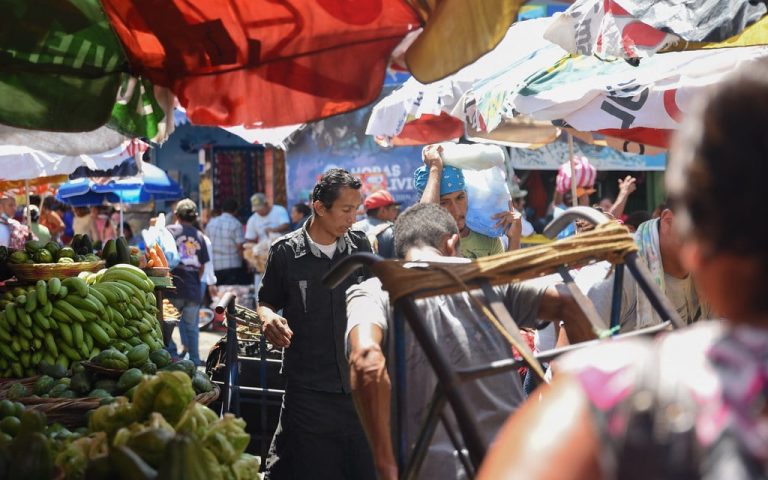7 de diciembre 2020

Children of Exile: The Births “Sowing Hope” in the Camp of Nicaraguan Farmers

PUBLICIDAD 1M
PUBLICIDAD 4D
PUBLICIDAD 5D
Weekly news report: Nicaragua is as poor as in 2010, according to Fideg. Also, the regime has intensified the repression against opponents

Weekly news report: Nicaragua is as poor as in 2010
Poverty levels in Nicaragua have regressed a decade, according to a household survey, prepared by the International Foundation for the Global Economic Challenge (Fideg).
According to the document, in 2019, 44.4 percent of Nicaraguans lived in conditions of general poverty, that is, their consumption was less than 28,336 córdobas per year per person. While 8.9% were in extreme poverty.
2019 was the second year of economic recession, with a fall in GDP of -3.9%, which was manifested in the loss of hundreds of thousands of jobs, tens of thousands of INSS affiliates, business closures, and a drop in consumption.
The economic crisis is the result of the socio-political crisis that detonated as a reaction to the massacre perpetrated by the Daniel Ortega regime against citizens who demanded justice, democracy, and free elections after April 2018.
Fideg's data for 2019 is similar to 2010 when the overall poverty level was 44.5 percent.
Read the full report in Spanish.
The Inter-American Commission on Human Rights of the OAS demanded the release of 109 political prisoners who are in the prisons of the regime for participating in or supporting the social protests of 2018.
In a report on the situation of human rights of political prisoners, the IACHR revealed that at least 1,614 people were arbitrarily detained, from April 18, 2018, to May 31.
The report highlighted that the regime imprisoned more than 200 adolescents during the first days of the protests. The minors were tortured and detained for several days in adult prisons.
Read the full report in Spanish.
This weekend, the National Police increased the siege against released prisoners, opposition leaders, relatives of political prisoners, and victims of repression, and imposed house arrest on them through de facto means.
The police deployment imposed a siege on the houses of Miguel Mora, a member of the National Coalition; Carlos Pavon, father of the murdered young man Richard Pavón; Ivania Álvarez, member of the Political Council of the National Unity; Karen Lacayo, sister of political prisoner Edward Lacayo; among others, and prevents them from leaving their home.
The Public Ministry accused the 21-year-old opponent Dorling Antonio Montenegro Muñoz of committing the crime of attempted homicide against three agents of the Wiwilí Police, in Jinotega.
Montenegro is a recognized family of opponents of the regime, and they have been victims of police and paramilitary persecution. Four of them have been executed and one has been sentenced to ten years in prison.
Read the full report in Spanish.
A group of victims of the Wounta Bar region, affected by hurricanes Iota and Eta, were removed from the Caribbean university Bicu, claiming that the institution would resume its classes.
The Caribbean activist, Juana Bilbano, stressed that those expelled were mainly women and children since the men had returned to their lands.
According to Vice President Rosario Murillo, some 133 families - equivalent to 663 people - continue to be housed in schools and private homes in the municipality of Bilwi.
Read a report on the matter, in English.
The director of the Central American Bank for Economic Integration (CABEI), Dante Mossi, denied that this regional body has an agreement with the Nicaraguan government for the purchase of vaccines against the coronavirus.
Nicaraguan Finance Minister Iván Acosta told official media that the Government had $ 107 million available to purchase the vaccine. The money would supposedly come from CABEI and the Inter-American Development Bank.
The National Coalition indefinitely suspended the Constitutional Liberal Party (PLC) from its ranks, signaled as being under the control and influence of Ortega.
The decision was made after the PLC authorities joined forces with FSLN deputies to remove María Fernanda Flores’ deputy status, who is the wife of former President Arnoldo Alemán.
Read the full report in Spanish.
Civil society organizations and opposition leaders filed an unconstitutionality appeal against the Foreign Agents Law because, in their opinion, it violates the human rights of Nicaraguans.
According to the opposition, the legislation violates at least 17 articles of the Nicaraguan Constitution and four numerals, for which they request that the law be partially repealed in articles one and three.
The Institute on Race, Equality, and Human Rights demanded that the Inter-American Court of Human Rights (IACHR) declare the international responsibility of the State of Nicaragua for the violation of the rights of 39 independent journalists.
The international NGO explained that the communicators have been victims of attacks, death threats, arbitrary arrests, theft, and destruction of their equipment, as well as raids and illegal occupations of their property.
Those affected have been directors and journalists of Radio Darío, Confidencial and Esta Semana, 100% Noticias, and Radio La Costeñísima.
Read the full report in English.
This article has been translated by Ana Maria Sampson, a Communication Science student at the University of Amsterdam and member of our staff*
PUBLICIDAD 3M
Confidencial es un diario digital nicaragüense, de formato multimedia, fundado por Carlos F. Chamorro en junio de 1996. Inició como un semanario impreso y hoy es un medio de referencia regional con información, análisis, entrevistas, perfiles, reportajes e investigaciones sobre Nicaragua, informando desde el exilio por la persecución política de la dictadura de Daniel Ortega y Rosario Murillo.
PUBLICIDAD 3D